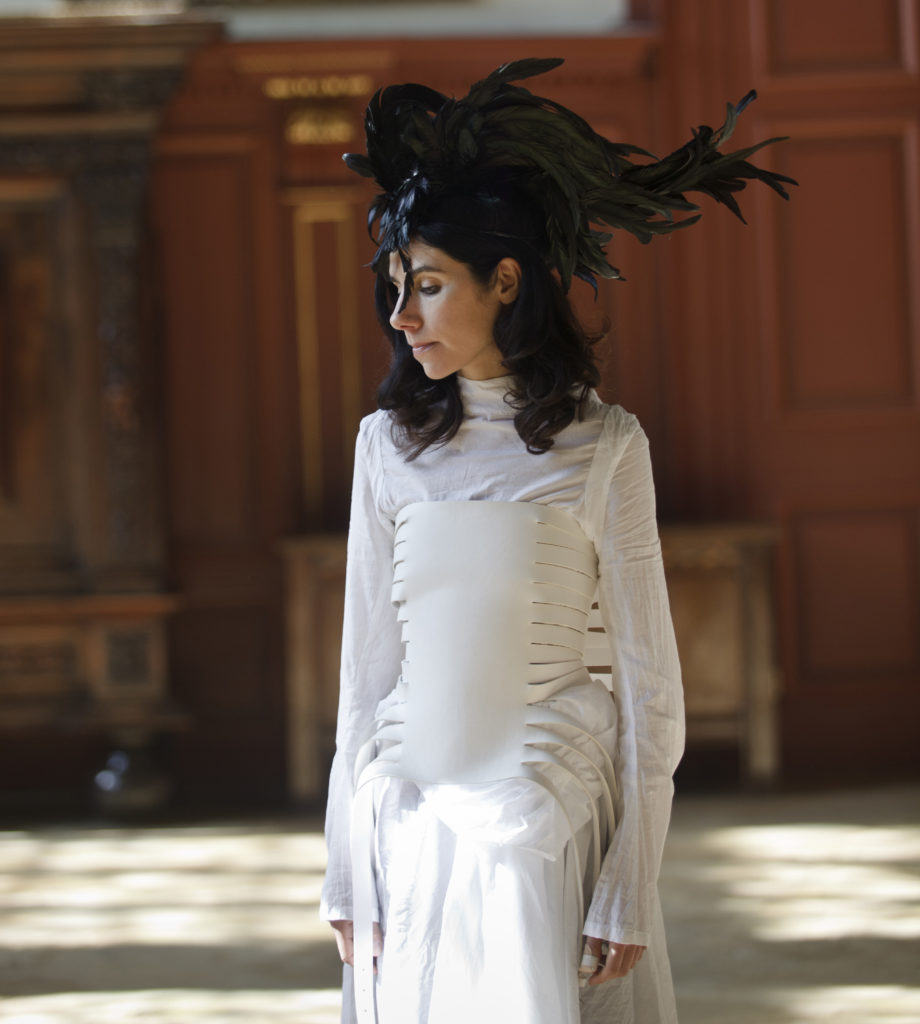The Hollow of Her Hand
Interview
Sharon O’Connell reflects on the unique art of
PJ Harvey, songwriter, poet and vocalist, and special
guest at the Poetry & Lyrics Festival this June.
‘Poetry is not a turning loose of emotion,’ declared TS Eliot in his essay Tradition and the Individual Talent, of 1919, ‘but an escape from emotion; it is not the expression of personality, but an escape from personality.’
The same can easily be said of songwriting – and Eliot’s distinctions certainly ring true in relation to much of Polly Jean Harvey’s work.
Over a career spanning nearly 25 years, the Dorset-born songwriter, poet and musician has shaped a uniquely spirited and uncompromising artistic expression that has moved from raw, punk-blues songs with her at their centre, through stories of intriguing characterisation told against ghostly piano tunes and sweetly lyrical examinations of national identity and the terrible damage done by war, to reflective mini-travelogues cast in an easy-swinging mix of blues, alt-rock and balladry.
Indeed, there’s no one PJ Harvey voice, but rather multiple voices, every one as authentic as the next. So it’s appropriate that she comes to Kings Place in June as a poet rather than a musician, airing the literary aspect of her multifaceted artistry. The perennial curse of the singer/songwriter is the assumption that their lyrics are autobiographical outpourings, as if invention, or even elaboration, is beyond them.
But Harvey has always refused to confirm her words as either fact or fiction. She’s yet to explain a single one of her songs, not only because for her, the combination of music and words is a frame for expression, not a finished picture, but also because she feels that once they’re let loose into the world, the songs are no longer hers but ours, to make of what we will.
‘She says poetry is ‘this strange, mysterious thing that people can do with words’.’

That said, it’s hard to doubt the startlingly unambiguous ‘Dry’, from Harvey’s 1992 debut album of the same name – where she damns a lover with reference to the bodily lubrication that cannot lie – or the torrid title track on Rid of Me, a year later, where she howls, ‘I beg you my darling/Don’t leave me/I’m hurting/Lick my legs, I’m on fire/ Lick my legs of desire’. But alongside these songs stand entire albums that run counter to the popular (mis)conception of Harvey as a wild expressionist. In 2007, she opened an entirely new artistic chapter, which has produced some of her most strikingly original work. Her earlier records used the language of American blues and rock ’n’ roll, which was the music she grew up with, but with the delicate White Chalk album, she effected a radical change by writing her songs at the piano and by singing in a very different, much higher and, in her view, more unselfconsciously ‘English’ voice. She also sparked plenty of speculation with the chilly ‘When Under Ether’, which appeared to be written from the perspective of a woman undergoing a pregnancy termination.
That album paved the way for the more outward looking Let England Shake in 2011, which stands
as a creative peak and was awarded the Mercury music prize, making Harvey the only artist to have won it twice. Here, her words are every bit as vital as the nuanced yet compelling music,
addressing as they do the unspeakable horrors of the Great War, along with wider notions of English identity. It’s not protest politics, but a quiet (researched) investigation.
‘Her words are every bit as vital as the nuanced yet compelling music’’
Harvey’s lyrics tend to start out as poems, then evolve according to her songs’ needs, although she didn’t start experimenting with poetry writing per se until around 2000, drawn to it because of the discipline it demands. There’s a lean, modernist streak in her first poetry volume, The Hollow of the Hand. It was published in 2015 and features the photographs of Seamus Murphy, who visited Afghanistan, Kosovo and Washington DC with Harvey on an experience-gathering trip. She transposed those reportage-style poems into songs for her latest record, The Hope Six Demolition Project, which underlined the steady shift of focus from her interior world to the external world, via lyrics that subordinate personal emotional truths to wider political and historical concerns. It’s evidence of PJ Harvey’s ever-strengthening interest in the sheer power of poetry – what she once called ‘this strange, mysterious thing that people can do with words’…
Take Three Beaters…
Interview
Three star percussionists appearing in Time Unwrapped discuss their approaches to performance with Amanda Holloway.
Tempo Ticciati
Q&A
Hugo Ticciati is artist-in-residence for Time Unwrapped. Here he introduces his own curations and his fascination with the connection between…
Song Cycle
Feature
Eliza Carthy belongs to a musical dynasty stretching back several generations. She reflects on her dialogue with her predecessors, and…
Of breath and bow hair...
Interview
Three sopranos talk about the pleasures of performing with the cello
Nicolas in the Underworld
Interview
Cellist Nicolas Altstaedt comes to Kings Place as both soloist in Haydn’s first concerto and collaborator in a new work…
Fifty Shades of Blue
Interview
Thomas Gould is no ordinary violinist: he’s a concerto soloist, orchestral leader, swing-band player and jazz improviser. This season he…